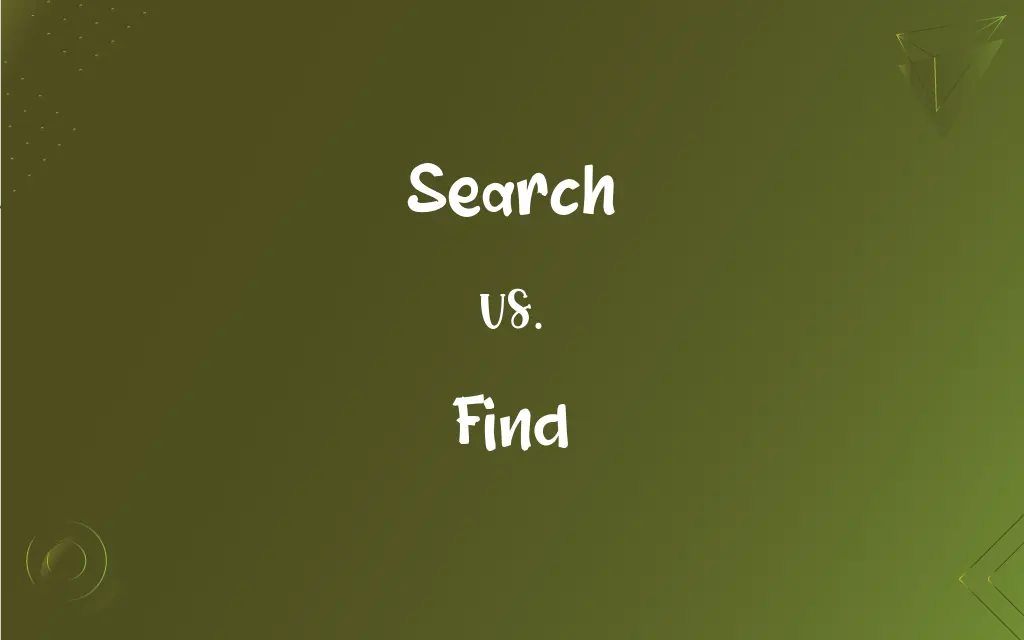Search vs. Find: What's the Difference?
Edited by Aimie Carlson || By Janet White || Published on April 8, 2024
"Search" implies actively looking for something, while "find" means successfully discovering something as a result of searching.

Key Differences
"Search" refers to the act of looking for something or someone, often without a guarantee of success. It implies a process, a quest with an uncertain outcome. Conversely, "find" suggests the successful conclusion of a search, where the object or person sought is discovered or obtained.
"Search" can be a physical or metaphorical journey, involving a thorough or systematic examination. It often requires effort and persistence. "Find", on the other hand, signifies the moment of discovery or realization, the end-point where the search is concluded successfully.
In usage, "search" can also imply a broader, more exploratory action, where the searcher might not know exactly what they are looking for. "Find" is more specific, indicating that what was sought has been located and is now known.
"Search" often involves a process that can be lengthy and complex, incorporating various methods or tools. "Find" is more instantaneous, a moment of revelation or achievement that follows the act of searching.
The emotional context of "search" can involve uncertainty, hope, or frustration, reflecting the ongoing nature of the action. In contrast, "find" usually brings a sense of fulfillment, relief, or surprise, echoing the satisfaction of a successful search.
ADVERTISEMENT
Comparison Chart
Primary Meaning
Act of looking for something
Act of successfully discovering something
Process vs. Outcome
Indicates the ongoing process
Indicates the outcome of the process
Certainty
Uncertain about the outcome
Certain, as the object is discovered
Duration
Can be long and ongoing
Momentary, at the point of discovery
Emotional Context
Often involves anticipation or anxiety
Associated with satisfaction or relief
ADVERTISEMENT
Search and Find Definitions
Search
To look over or through for the purpose of finding something.
She searched her room for her lost keys.
Find
To discover or perceive after consideration.
He found the solution to the puzzle.
Search
To explore or examine in order to discover.
Scientists search the universe for signs of life.
Find
To recover something lost.
I finally found my glasses under the bed.
Search
To inquire into or discuss in detail.
He searched the topic thoroughly in his essay.
Find
To ascertain by study or experiment.
Researchers found that the treatment was effective.
Search
To go through (a place) to find something or someone.
Firefighters searched the building for survivors.
Find
To come upon by chance or unexpectedly.
She found a rare coin in the attic.
Search
To probe or examine thoroughly.
The detective searched the crime scene for clues.
Find
To experience or undergo.
She found joy in painting.
Search
To move around in, go through, or look through in an effort to find something
Searched the room for her missing earring.
Searched the desk for a pen.
Find
To come upon, often by accident; meet with
Found a dime on the floor.
Search
To make a careful examination or investigation of; probe
Search one's conscience for the right thing to do.
Find
To come upon or discover by searching or making an effort
Finally found the leak in the pipe.
FAQs
Is "search" only physical?
No, it can also be metaphorical, like searching for truth.
Can "find" be used to describe an emotional discovery?
Yes, one can "find" happiness or peace, implying emotional realization.
Does "find" always require a search?
Not always; sometimes things are found by chance.
What does "search" imply in a legal context?
In legal terms, "search" refers to examining a place or person for evidence.
Can "search" be used in a digital context?
Yes, like searching the internet for information.
Is "find" used in legal language?
Yes, like finding someone guilty or innocent.
Does "find" imply success?
Yes, it implies successfully discovering or realizing something.
How does "search" relate to research?
"Search" is a component of research, involving investigation.
Can "find" refer to a decision or judgment?
Yes, like a court finding in a legal case.
Can "find" be a passive action?
Yes, one can find something without actively searching for it.
Can "search" imply desperation?
Yes, especially in urgent or important quests.
Does "find" suggest completion?
Yes, it often indicates the end of a search.
Does "search" have emotional connotations?
Yes, often implying anticipation or anxiety.
Can "search" be unintentional?
Generally, searching is a deliberate action.
Is "search" always a physical action?
No, it can also be abstract, like searching for answers.
Does "search" always involve a goal?
Typically, but the goal may be vague or exploratory.
Is "find" always concrete?
No, it can also refer to abstract discoveries.
Can "search" be a noun?
Yes, referring to the act of searching.
Is "find" ever used in a negative context?
Sometimes, like finding trouble or problems.
Can "find" be used in a metaphorical sense?
Yes, like finding one's way in life.
About Author
Written by
Janet WhiteJanet White has been an esteemed writer and blogger for Difference Wiki. Holding a Master's degree in Science and Medical Journalism from the prestigious Boston University, she has consistently demonstrated her expertise and passion for her field. When she's not immersed in her work, Janet relishes her time exercising, delving into a good book, and cherishing moments with friends and family.
Edited by
Aimie CarlsonAimie Carlson, holding a master's degree in English literature, is a fervent English language enthusiast. She lends her writing talents to Difference Wiki, a prominent website that specializes in comparisons, offering readers insightful analyses that both captivate and inform.































































